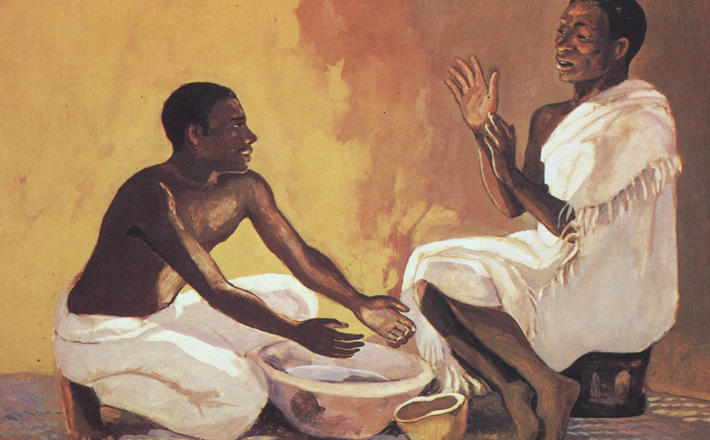Commentary on John 13:1-17, 31b-35
Here we are in the midst of Holy Week, the most dramatic time of the Christian faith.
In one week we go from glory to Glory with everything else in between. The variety of celebrations in our churches goes from a highly staged drama throughout the week to an absolute dismissal or carelessness about these liturgical dates. I grew up in Brazil not observing Ash Wednesday, or Maundy Thursday, or even Holy Friday. We went from Christmas straight to Easter. Everything else in between was deemed Roman Catholic, thus it had to be denied.
It was my adviser, the Episcopalian priest Jaci C. Maraschin, who taught me the richness of liturgy and the importance of this week. He used to take me to wonderful services during the week with fantastic worship, and I started to love it. Walking around the block on Palm Sunday, Tenebrae Service perhaps on Wednesday, Maundy Thursday, Good Friday, Saturday of Alleluia, and Easter Sunday became one of the most regular liturgical seasons for me. One week to go from self-enclosed rituals to world changing events, from reflecting only on myself to reflecting on God and back to myself. It is an intense week of self-discovery.
This week has its own pace, filled with distinct feelings. To reenact these feelings is a fantastic experience for the faithful. The glory and joy of Palm Sunday quickly turns into lamenting at Wednesday’s Tenebrae, the sadness and anxieties of Maundy Thursday, the hopelessness of Good Friday, the Alleluias of Saturday, and the Gloria of Easter Sunday.
But today we are at Maundy Thursday. There is something strange about today. Our Jesus is saying and doing strange things, declaring that he is going places nobody can go. At the same time, we see the disciples learning about a potent symbol of the Christian faith: the towel. In the early Christian days, when people were invited to a meal, after walking through dirty roads, they were greeted by somebody at the door with a towel, a basin, and water to wash the feet and the hands of the guests. The person at the door was a fundamental part of the meal even though this person never participated in the meal. Usually a nameless slave was the one who made meals possible, exactly like our societies today where the poor, the undocumented, the marginalized are the ones who harvest our food, who clean our houses, who do all of the hidden services of our society so we can have the things that make our lives happen.
When Jesus wraps his waist with a towel, he shocks his disciples. Peter can’t understand it because Jesus was mirroring the work of an insignificant slave. He says something like this: “Are you kidding my Lord, are you going to wash my feet? No way! This is way too embarrassing. You cannot do that, this is the work of slaves, of servers, of those who we don’t care and are supposed to keep our hierarchical class system functioning.” But Jesus insists and says: “Unless I wash you, you have no share with me.” Perhaps saying: “unless you take the position of those at the bottom of society, you cannot see me, claim you know me or do what this mission is all about.” And Peter, in his usual exaggerated way says: “Lord, not my feet only but also my hands and my head!” You gotta love Peter! It is either/or but in all ways, fullness is required! A towel, a basin and water: markers of the mission of the church. Nothing more, nothing less.
After that perhaps embarrassing moment, with Jesus touching the disciples’ feet, they all go back to the table and Jesus asks them if they knew what that was all about. He says that they are right to call him Teacher and Lord but nothing would matter if they didn’t do exactly the same thing to others. “If you know these things, you are blessed if you do them.” Many of us have forgotten this blessing. There is an ordinance (a sacrament?) right there for all of us to follow! But we found a way around it and turned it into Jesus best practices, Jesus’ cute little gesture, another important moment of Jesus niceness.
Beyond that we can’t take it. We can barely even wash the feet of our people in our worship services much less do it in real life. Pope Francis washed the feet of people in prison on Maundy Thursday, people from various faith traditions! Imagine this: our churches actually hearing the gospel and going out to wash the feet of the homeless of our cities, the feet of the native, of the undocumented, of the incarcerated. Oh there would be a lot of black feet to kiss that is for sure! Surely we can’t stand that. We’d rather stay with either a bloody Jesus image or an empty cross so we can use it as a shield against our confortable self-enclosed life styles, our nice detachment from the bottom of society and against God’s wrath.
Maundy Thursday/Holy Thursday holds a mandatum, i.e., the commandment of Jesus Christ to go wash somebody’s feet. We are talking about a commandment not a choice. The washing of feet has the potential to revamp the structures of class society, turning upside down the location of the value of one’s humanity! The washing of feet is the caring of somebody’s body, the materiality of someone’s Spirit, the flesh of someone’s life who dreams, desires, hopes and lives. As we obey the commandment to touch someone else, the washing means to care for the fullness of someone’s life. The other gospel narrates the foot washing as part of the Lord’s Supper. Thus at every Eucharistic table, there must be a basin with baptismal waters! Take (feet, bread, and wine), wash, bless, eat! Or take (feet, bread, and wine), eat, bless, wash! All the senses felt, perceived, honored! God fully there! Restoring people’s humanity and honor! Somebody fully cared, attended, and society fully transformed! Because it is only after the washing of the feet that Good Friday and Easter Sunday will make sense. Get prepared for real Christianity: all you need is a towel, a basin and some water (better if not privatized). Go and serve!


March 24, 2016